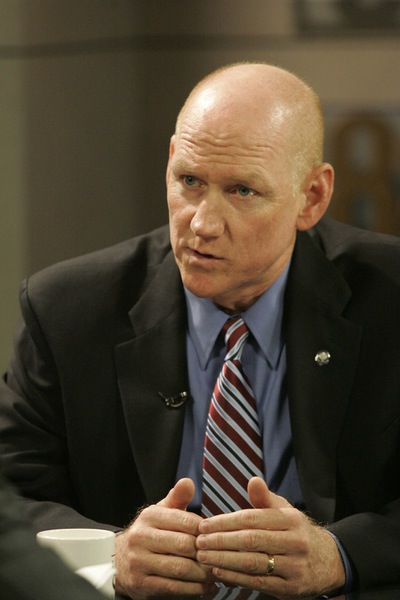Thursday, Nov. 5, 2009 | 2 a.m.
Related Document (.pdf)
Darling Memorial Tennis Center
Sun Archives
- City found at fault in tennis court defects case (11-3-2009)
- Mob museum contractor at odds with city (8-8-2009)
- So sue us, you can still work for us (12-17-2007)
Former Councilman Larry Brown was always among the cooler characters on the Las Vegas City Council. In contrast to Mayor Oscar Goodman with his outbursts and lectures, Brown usually laid out the facts in measured tones.
So it was a surprising departure for Brown, now a Clark County commissioner, when he returned to council chambers Wednesday to lash out at arbitrators who found that Brown and his council aides may have been at fault in the costly fiasco surrounding the cracked courts at Darling Memorial Tennis Center.
“The public record needed to be responded to personally,” he said emphatically to his former council colleagues before they voted to put the matter behind them. “If I let that statement stand without responding to it, it becomes the truth. And it’s dead wrong.”
Brown was one of several current and former Las Vegas officials who vehemently defended their handling of the contract to build the Kellogg-Zaher Sports Complex.
In a 2-1 decision, state arbitrators slammed the city’s handling of the construction of the faulty courts. The majority arbitrators found that city managers knew their plans for the tennis center and the surrounding park were defective but proceeded anyway.
The park covers 110 acres between Summerlin Parkway and Washington Avenue, from Buffalo Drive to Durango Drive.
The matter resulted in competing $7 million legal claims between the city and APCO Construction, the general contractor on the project — and the most expensive arbitration in city government history.
APCO Construction had claimed the city ignored the company’s concerns about design flaws. The city filed a counterclaim, alleging the center’s 23 courts weren’t built properly because of APCO’s negligence.
Blaming everyone in city government “was an easy way to avoid answering why this really happened,” City Attorney Brad Jerbic said.
Goodman added that a lot of things about the matter “stunk,” including the fact that his own advisers assured him the city’s case was a “slam dunk.” The majority opinion was unfairly slanted, Goodman continued. “I think it was full of inconsistencies.”
The majority ruling hit the city’s Building and Safety Department for not fully approving the plans before they were put out to bid, and took to task then-Public Works chief Richard Goecke, who ordered the plans be bid upon despite recognizing that they were faulty.
“It is clear that the city actively interfered and failed to cooperate with APCO in overcoming the problems created by the plans, which they knew from the beginning were defective and would interfere with APCO’s performance,” wrote the two arbitrators who signed the majority decision.
They also found fault with Brown, an avid supporter of parks and representative of the ward where the tennis center is located. The center was a “high-profile project” for Brown, the arbitrators stated, causing him and his aides to put pressure on city staffers “to get the project out as soon as possible.”
Brown said he had been within his rights to ask city staffers about the status of ongoing projects, and that he never pressured them into inappropriately rushing the project. The accusation that Brown’s council aides also put undue pressure on city staff, he said, was “frivolous, untrue and a cheap shot.”
He said he was never told by city staff that his involvement was potentially a legal issue, nor was he called as a witness before the arbitration panel though he would have been happy to testify.
The arbitrators had more than enough time to do so. The votes Wednesday ended a four-year legal dispute, including 2 1/2 years of arbitration.
The council unanimously agreed with Jerbic’s recommendation to pay the
$2.13 million award recommended by arbitrators, including roughly $980,000 in damages. The council also voted not to appeal the ruling.
Before Brown took the microphone to say his piece, Mayor Pro Tem Gary Reese became visibly emotional while defending him. Any insinuation that Brown had done something wrong was “just unfair,” he said.
Reese continued: The city should name something after Brown, a former baseball and football star while an undergraduate at Harvard University, because of his love and promotion of public sports facilities while on the council.
Brown thanked Reese but said he didn’t know if that would be necessary.


Join the Discussion:
Check this out for a full explanation of our conversion to the LiveFyre commenting system and instructions on how to sign up for an account.
Full comments policy